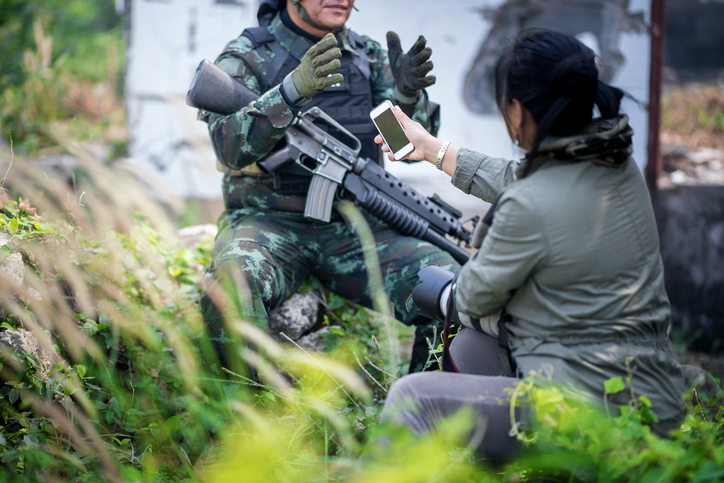Wise Giving Wednesday: Community Media Covering Ukraine in Wartime

BBB Wise Giving Alliance is pleased to release this seventh entry in a series of posts by Kateryna (Katya) Zhuk. Katya heads a Ukraine charity monitoring organization, Charity Tuner. This organization, along with BBB Wise Giving Alliance, is a member of an association of standards-based charity monitors from around the world.
Community Media Covering Ukraine During Wartime
By Kateryna Zhuk
Community or regional media play an extremely important role during wartime. Sadly, regional journalists based in the Russian occupied Ukraine territories during 2014-2015 were among the first media representatives killed in that conflict. Due to the destruction of the area (for example, Bakhmut) media survivors relocated and remain in the de-occupied territories, helping large international media to tell the real stories and fight fakes.
Readership Trust in Regional Media
No matter where Ukrainians are in the world now, no matter where they have traveled inside Ukraine fleeing from the war zone – we all (and me, of course, among others!) read our local news. By virtue of my profession, I am subscribed to local small media and groups all over Ukraine. I have believed for many years that community media influences the world because their representatives are those who live close to the action and have earned trust. But they all need help now more than ever.
The head of one of these regional Ukraine publications tells me, “…Foreign correspondents come to us [with] armored vests, helmets, a jeep, all taped up with “press” signs. And I say to them: ‘Do you want to film or do you want to sit down for a coffee? …Then quickly change your clothes, shorts, t-shirt, get in that dirty red local car, which all the drones already know, and pretend that you are local. Because your jeep will be bombed first, don’t you dare even bother.’ “
Who thinks about these nuances? Who knows where to go and where not to go? Regional small media. One small print publication noted that even Ukrainian soldiers on the front line read their paper.
Grant Funding Struggles
One of the main problems is that grant funding for regional media is often restricted for special projects. In other words, you have to think of an additional project beyond your regular publications to pply for funding. And then the journalist has a double burden – to do his regular work and, of course, cover the project as well. In fact, there is very little funding for institutional activity as such. Galyna Petrenko, director of a large portal for media professionals (Detector Media) also notes that you must know English to apply for funding which can sometimes involve a rather complicated grant reporting process.
Regional journalists help collect evidence of war crimes. It is not always the case that local residents who have suffered at the hands of the Russian military will tell big media about their experiences. Also, big media may face challenges in finding, contacting, and negotiating with local contacts. Local journalists, in contrast, can more easily identify humanitarian aid needs, know where it should be sent, and help check the facts while scraping together funding for salaries and office rent.
Unfortunately, Patreon and similar funding services don’t work in our situation. These funding systems usually require that you provide something extra to the patrons. Collections are very small and most of our readers have no money for obvious reasons. Many of the displaced Ukraine people can barely make ends meet (see my previous article – https://give.org/news/ukraine-housing-crisis.) They are more likely to donate to help the Ukrainian armed forces.
Staffing and Outreach Challenges
In addition, many of these regional publications are short-staffed. Some journalists have gone to the front lines. Others have gone abroad to save their children. It is impossible to cover local events from abroad, so people quit their jobs, look for work in new places and try to survive there.
It is difficult to reach a Western audience, get material properly translated to English, and later, to find a place to publish the article. Our way is to cooperate with large media outlets that come to us. After all, regional media is not only about news, it’s also about offering potential solutions. Our job can help change the world for the better by helping with investigations and fighting misrepresentations.
A newspaper editor from Bilopillya told me, “We have mobile apps with alarms, just to know – oh, the post office and the shop are closed. We are so used to it, we are bombarded all the time…”
A few months ago, Detector Media launched a platform that collects information about regional media that it verified for accuracy. I invite interested readers to go to the portal https://map.detector.media/# and select section 4 “regional”, there are 128 media so far. Find someone you like and please help them financially with their regular but incredibly important work.
Also, community media is a resource that helps me to monitor charitable foundations by region (reputation, partners, recipients, etc.).
The following are links to information from regional newsrooms that may provide more insight into what is happening in Ukraine, beyond the publicly available news from the big and, often, paywalled publications.
Kharkiv (constantly under rocket attacks): gwaramedia.com/en/
Bilopillia (Sumy region, under constant shelling) https://bilopillia.city/articles/327445/bilopilska-gromada-pid-obstrilami-situaciya-za-minulij-tizhden
Izyum (Kharkiv region, 6 months under occupation, largest unmarked burials of murdered civilians) https://city-izyum.pp.ua/help-and-support-of-media-raisin-information-donate/
Bakhmut (City in Donetsk region, completely destroyed, cannot be rebuilt, portal about the life of Bakhmut migrants) https://bahmut.in.ua/
Katryna Zhuk
Warsaw, Poland
January 02, 2024
Notes from BBB Wise Giving Alliance:
The links to news publications listed above were compiled by the author, Kateryna Zhuk. The views, information, or opinions expressed in this piece are solely those of Kateryna Zhuk and do not necessarily reflect the views of the BBB Wise Giving Alliance and its employees.
Heart of Giving Podcast
This week Heart of Giving Podcast features Jennifer Rodriguez, Executive Director, Youth Law Center. YLC is a charitable organization that works “to transform foster care and juvenile justice systems so every child and youth across the nation can thrive.”
Recent Reports
We are always working with charities to publish or update reports for donors. Visit Give.org or local BBBs to check out any charity before giving. Our recently evaluated charities include:
Finally, remember to let us know by going to give.org/charity-inquiry if you are interested in seeing a report on a charity not on the list and we will do our best to produce one.


